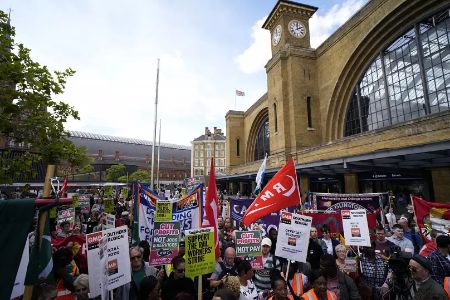
-
Published: 22 October 2022

Against the backdrop of the Russian war in Ukraine, Europeans have witnessed a rise in energy bills and food prices, and despite the decline in natural gas prices from a record high during the summer, and government support for households and businessmen in the field of energy amounted to 576 million euros since September 2021, this was not
enough for some protesters, according to the Bruegel research center.
The high price of Energy also led to an increase in the inflation rate in 19 countries within the eurozone to the level of 9.9%, which made it difficult for people to buy what they wanted, and some had no choice but to take to the street.
Rising inflation across Europe is behind the wave of protests and strikes expressing growing anger at the rising cost of living and the threat of an outbreak of political unrest.
In Romania, Protesters blew horns and beat drums to express their discontent, and in France people took to the streets demanding an increase in wages in proportion to inflation.
In the Czech Republic, demonstrators gathered against the government's handling of the energy crisis. Railway workers in Britain and pilots in Germany also went on strike for better wages, at a time when prices were rising.
At a time when British prime minister Liz Truss was forced to resign less than two months after taking office, after her economic plans caused chaos in financial markets and further damaged a faltering economy, the danger for political leaders has become more obvious, at a time when people are demanding real action.
According to the consulting firm "veresk Maplecroft", the fallout from the war in Ukraine has increased the risk of a civil uprising in Europe.
European leaders have aggressively helped Ukraine, sending it weapons, pledging or being forced to wean their economies off cheap Russian oil and gas, but the transition has not been easy and threatens to erode popular support.
In France, where inflation stands at 6.2 percent, the lowest in the euro zone, railway and Transport Workers, secondary school teachers and public hospital staff heeded the call of the Union of oil sector workers on Tuesday to demand higher wages and protest against government intervention in strikes by refinery workers, which caused fuel shortages.
In the Czech Republic, crowds of protesters demanded the resignation of the pro-Western government coalition, criticizing its support for EU sanctions against Russia. They also criticized the government for not doing enough to help families and businesses in a suffocating situation, due to high energy prices.
While the Czechs are preparing to organize another protest demonstration next week, this practically did not translate into political change, at a time when the government coalition won a third of the seats in the Senate (upper chamber) in Parliament, during elections held this month.
In Britain, railway workers, nurses, port workers, lawyers and others have staged a series of strikes in recent months, demanding a rise in wages in proportion to inflation, which reached its highest level in four decades at 10.1%
